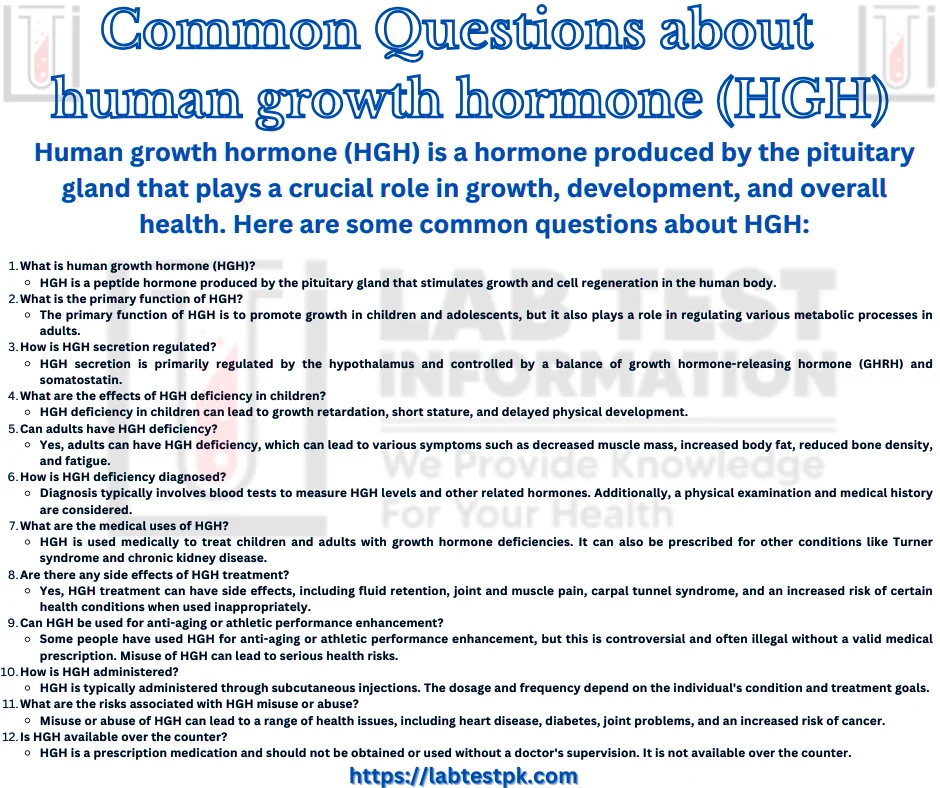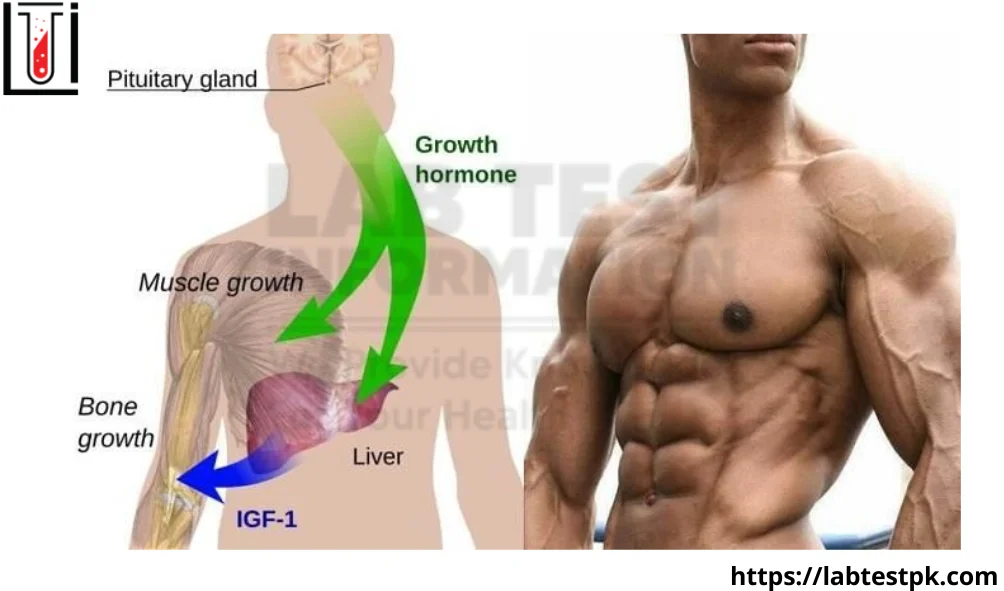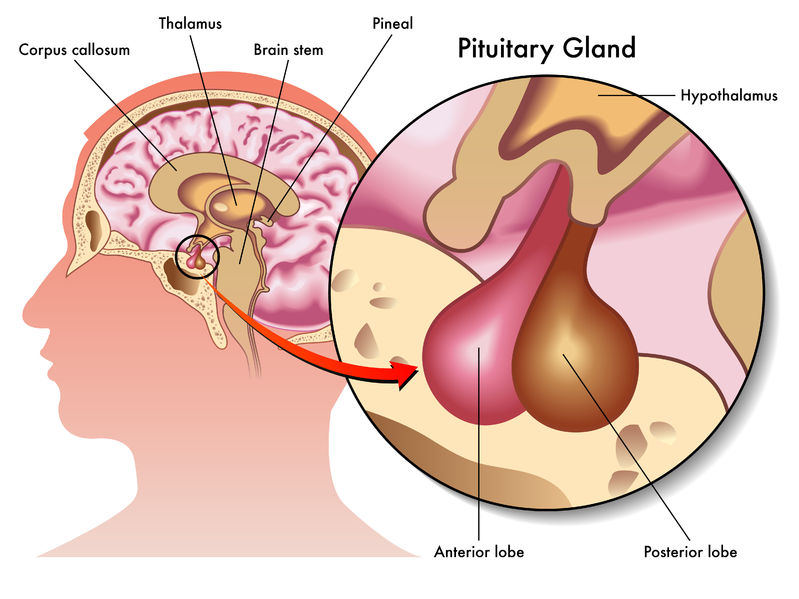Growth Hormone, Growth hormone (GH), also known as somatotropin, is a peptide hormone produced and released by the anterior pituitary gland, a small gland located at the base of the brain. It plays a crucial role in the growth, development, and maintenance of various tissues and organs in the human body. Here are some key functions and aspects of growth hormone:
- Growth Promotion: One of the primary functions of GH is to stimulate the growth of bones and tissues during childhood and adolescence. It helps to regulate the length and size of bones, resulting in an increase in height during growth periods.
- Metabolic Effects: Growth hormone also has significant effects on metabolism. It promotes the breakdown of fats (lipolysis) and the conversion of fats into energy, which can help in maintaining a healthy body composition. Additionally, GH can stimulate the uptake of amino acids and their incorporation into proteins, supporting tissue repair and maintenance.
- Regulation of IGF-1: Growth hormone indirectly stimulates the production of insulin-like growth factor 1 (IGF-1) in the liver and other tissues. IGF-1 plays a critical role in mediating many of the growth-promoting and metabolic effects of GH.
- Maintenance of Organs and Tissues: Beyond childhood growth, GH continues to play a role in maintaining the health and integrity of various organs and tissues throughout life.
- Regulation of Blood Sugar: GH can have an impact on glucose metabolism by reducing insulin sensitivity, which can lead to higher levels of glucose in the bloodstream.
- Sleep and Stress: GH secretion is highest during deep sleep and decreases during periods of stress or illness. Adequate sleep and reduced stress levels can help support the natural release of growth hormones.
- Medical Use: Synthetic forms of growth hormone are used medically to treat children and adults with growth hormone deficiency. It can also be prescribed for conditions like Turner syndrome, Prader-Willi syndrome, and growth-related disorders.
Growth hormone deficiency:
GH is a vital hormone produced by the pituitary gland, a small gland located at the base of the brain. It plays a crucial role in stimulating growth and development, especially during childhood and adolescence, but it continues to have important functions in adulthood as well.
Here are some key points about growth hormone deficiency:
- Causes:
- Idiopathic GHD: In many cases, the exact cause of GHD remains unknown and is referred to as idiopathic GHD.
- Congenital GHD: Some individuals are born with a deficiency of GH.
- Acquired GHD: This can result from damage to the pituitary gland due to tumors, surgery, radiation therapy, or other medical conditions.
- Genetic mutations: Rare genetic mutations can also lead to GHD.
- Symptoms in Children:
- Short stature (height significantly below average for age)
- Slow growth rate
- Delayed puberty
- Reduced muscle mass and strength
- Increased body fat
- Delayed tooth development
- Delayed bone age
- Symptoms in Adults:
- Fatigue and reduced energy levels
- Decreased muscle mass and strength
- Increased body fat, especially around the waist
- Decreased bone density, which can lead to osteoporosis
- Changes in lipid profile (elevated cholesterol and triglyceride levels)
- Reduced exercise capacity
- Impaired mental well-being, including mood disturbances
- Diagnosis:
- Diagnosis involves blood tests to measure GH levels. Doctors may also use provocative tests, like the insulin tolerance test or the growth hormone-releasing hormone (GHRH) stimulation test, to confirm the diagnosis.
- Imaging studies, such as MRI or CT scans, may be used to assess the pituitary gland’s structure and rule out any tumors or structural abnormalities.
- Long-Term Outlook:
- With appropriate treatment, individuals with GHD can experience significant improvements in their symptoms and overall well-being.
- Children who receive treatment for GHD usually achieve a more normal height and development.
- Adults can benefit from increased energy, improved body composition, and enhanced bone health.
What are normal levels of human growth hormone:
Normal levels of human growth hormone (HGH), also known as somatotropin, can vary depending on age, sex, and individual factors. However, here are approximate guidelines for normal HGH levels:
- Children and Adolescents: During childhood and adolescence, HGH levels are naturally higher to support growth and development. Normal levels typically range from 0.5 to 20 nanograms per milliliter (ng/mL). Levels can vary significantly during this period.
- Adults: In adulthood, HGH levels decrease, but they are still important for various bodily functions. Normal HGH levels in adults generally range from 0.1 to 8 ng/mL. Levels are typically higher during periods of physical activity, stress, and deep sleep.
It’s important to note that HGH secretion is pulsatile, meaning it is released in bursts throughout the day, with the highest levels occurring during the early stages of deep sleep. Additionally, HGH levels can be influenced by factors such as exercise, nutrition, stress, and medical conditions.
Abnormally low levels of HGH can lead to growth disorders in children and can contribute to symptoms such as fatigue, decreased muscle mass, and increased body fat in adults. Abnormally high levels of HGH can result from conditions like acromegaly or gigantism and can lead to excessive growth of tissues and organs.
Why do I need a Growth Hormone Test:
This test is typically performed for various reasons, depending on the symptoms or medical conditions you may be experiencing. Here are some common reasons why you might need a Growth Hormone test:
- Growth Disorders: The most common reason for undergoing a Growth Hormone test is to assess growth disorders in children and adolescents. Growth hormone is essential for normal growth and development, and a deficiency or excess of this hormone can lead to stunted growth or excessive growth. This test helps doctors diagnose conditions like growth hormone deficiency or excess (acromegaly or gigantism).
- Monitoring Growth Hormone Therapy: Children or adults who have been prescribed growth hormone therapy may need regular GH tests to monitor treatment progress and adjust the dosage as needed.
- Evaluation of Short Stature: If a child is significantly shorter than peers and there is a concern about a possible growth hormone deficiency, a GH test may be ordered to investigate the cause of short stature.
- Assessment of Pituitary Function: The pituitary gland, located at the base of the brain, produces and releases growth hormone. GH tests may be part of a broader evaluation of pituitary function when there are suspicions of pituitary disorders, such as tumors or other hormonal imbalances.
- Diagnosis of Acromegaly or Gigantism: In adults, an excess of growth hormone due to conditions like acromegaly or gigantism can lead to abnormal growth of bones and tissues. GH testing can help confirm the diagnosis of these conditions.
- Monitoring Treatment for Acromegaly: People with acromegaly often undergo treatment to reduce excessive GH production. Periodic GH tests are used to monitor the effectiveness of treatment and ensure that GH levels are brought under control.
- Turner Syndrome or Prader-Willi Syndrome: GH testing may be part of the diagnostic process for certain genetic conditions like Turner syndrome or Prader-Willi syndrome, which can affect growth and development.
- Evaluation of Adult Growth Hormone Deficiency: GH testing is sometimes done in adults who show symptoms of growth hormone deficiency, such as fatigue, muscle weakness, and changes in body composition.
What Does The Growth Hormone Test Result Mean?
Here’s what the results of a growth hormone test can indicate:
- Normal Growth Hormone Levels: If the test shows that your GH levels are within the normal range, it suggests that your body is producing an appropriate amount of growth hormone, and there are no concerns related to GH production or regulation.
- Growth Hormone Deficiency: Low levels of GH in the blood may indicate growth hormone deficiency (GHD). GHD can occur in children or adults and can lead to growth-related issues such as short stature in children or decreased muscle and bone mass in adults. Treatment for GHD may involve GH replacement therapy.
- Growth Hormone Excess: Elevated GH levels can suggest a condition known as acromegaly in adults or gigantism in children. These conditions are typically caused by a benign tumor in the pituitary gland that produces excessive GH. Symptoms of GH excess can include abnormal growth of tissues, enlarged facial features, joint pain, and other health problems. Treatment for GH excess often involves surgery to remove the tumor or medications to control GH production.
What happens when human growth hormone (HGH) levels are too high?
This can result from various causes, including medical conditions, tumors, or the use of synthetic HGH for performance enhancement or medical treatment. Here are some potential consequences of elevated HGH levels:
- Acromegaly: Acromegaly is a rare disorder characterized by the excessive growth of bones and tissues, particularly in the face, hands, and feet. It occurs when the body produces too much HGH after the growth plates in the bones have closed, usually in adulthood. Common symptoms include enlarged facial features, enlarged hands and feet, joint pain, and thickened skin. Acromegaly can lead to serious health problems if left untreated, such as cardiovascular issues and organ enlargement.
- Cardiovascular problems: Elevated HGH levels can lead to an increased risk of cardiovascular issues, including hypertension (high blood pressure) and heart disease. The excess growth hormone can cause the heart to enlarge, increasing the workload on the cardiovascular system.
- Insulin resistance: High levels of HGH can lead to insulin resistance, which means that the body’s cells do not respond effectively to insulin. This can result in elevated blood sugar levels and an increased risk of type 2 diabetes.
- Joint and muscle problems: Excess HGH can cause joint and muscle pain, as well as stiffness. This can impact mobility and overall quality of life.
- Organ enlargement: Hypersecretion of growth hormone can lead to the enlargement of various organs, including the liver, kidneys, and spleen. This can result in abdominal discomfort and other complications.
- Increased risk of certain cancers: There is some evidence to suggest that long-term exposure to high levels of HGH may increase the risk of certain types of cancer, particularly colorectal cancer.
- Psychological and emotional effects: High HGH levels can also lead to mood swings, anxiety, and depression in some individuals.
Treatment for elevated HGH levels typically involves addressing the underlying cause. This may include surgery to remove tumors or other interventions to regulate hormone production. In cases of acromegaly, treatment may also involve medications to reduce HGH production or its effects on the body.





[…] Fatigue […]
[…] spontaneously or be induced by environmental factors like radiation or chemicals. Over time, these mutations can accumulate and lead to different genetic variations in a […]
[…] Hormone (ACTH), also known as corticotropin, is a hormone produced and secreted by the anterior pituitary gland in the brain. It plays a crucial role in regulating the body’s stress response and the […]
[…] CT Scan […]
[…] Turner syndrome (Monosomy X) […]
[…] and Mood: Testosterone can affect energy levels and mood. Low testosterone levels may lead to fatigue, irritability, and […]
[…] commonly found in proteins. They can be classified into two categories: essential and non-essential amino acids. The human body cannot synthesize essential amino acids which must be obtained through the diet, […]